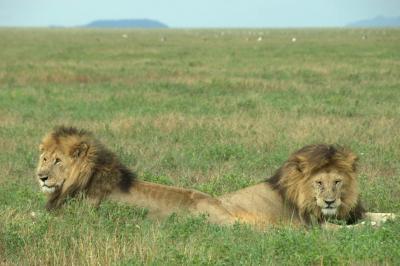Hunters are often regarded as the enemy by animal activists but in reality the opposite is true; legal hunting helps sustain populations, even trophy hunting.
Trophy hunting occurs in 9 of the 28 African countries that have wild populations of lions. Hunting is legal in these countries but quotas are set to restrict the numbers of lions that can be killed.
Though such hunting is controversial in first world countries, evidence shows it helps conservation efforts because it generates substantial revenue - hunting is also an important cultural pastime in the US. Deer hunting licenses in Pennsylvania pay for all those government biologists. In Africa, hunters can pay up to US$125,000 to shoot a male lion, which enables governments to leave wilderness areas as habitats for wildlife, rather than turning the land over for other uses such as farming. And it pays a lot of salaries.
But making sure the quotas promore sustainability and are not just matching the people willing to pay is another issue. No one knows the total number of lions inhabiting their countries. If estimates are accurate, there has been a decline in the number of lions across Africa, from an estimated 100,000 fifty years ago to roughly 30,000 today.

Lions in the Serengeti National Park, Tanzania. Credit: Nils Bunnefeld
In a new paper, conservation scientists from Imperial College London and the Universities of Stirling and Cape Town devised a method that should ensure more sustainable hunting quotas. They created an algorithm that uses data about how long it takes to find and shoot a lion in a given area to estimate how many adult males can be hunted, whilst allowing the lion population to grow.
The researchers modelled the effects of introducing their new method for setting hunting quotas in a heavily depleted lion population and found that the number of adult males would grow from around 38 to 100 individuals in 30 years. During the same time, the sustainable quota could increase from 15 to 22 lions, thus benefiting hunters.
Professor E.J. Milner-Gulland, one of the authors of the research from the Department of Life Sciences at Imperial College London, said: "Many people don't feel happy about the idea of hunting animals for sport, especially animals that are as beautiful and impressive as lions. However, in some areas, the money that comes in from hunting is what enables the land to be set aside for wildlife and this provides the lions with a home.
"As conservation scientists, we want to ensure that populations of lions can thrive. Our model shows that it is possible for lion numbers to grow even where there is hunting, but this only works if you set quotas for hunting at the right level, and in many places this is not happening at the moment. Our new method for setting quotas relies on information that is easy for governments to get hold of and it should be simple for them to use. It could also be used to set reliable quotas for other animals which are hunted by searching for individuals, such as wild sheep or deer. The next step is for us to test the method in the field and if it proves successful, we hope it can be widely adopted."
Source: Imperial College London





Comments